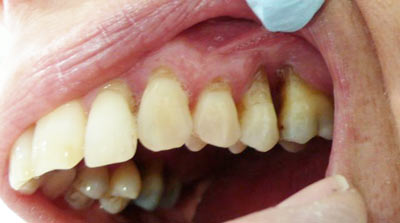Side Effects Of
Gum Disease
You're maybe wondering what side effects of gum disease there might be that could possibly affect your general health and well-being. After all, your dental health should only affect teeth and gums, right?
Wrong !
The August 10 2019 edition of New Scientist magazine reports on findings that one particular bacteria involved in gum disease (P. gingivalis) seems to be involved in a host of medical conditions. The side effects of gum disease include;
- Heart disease
- Stroke
- Alzheimer's
- Diabetes
- Parkinson's disease
- Pancreatic cancer
- Kidney disease
- Rheumatoid arthritis
- Fatty liver disease
- Macular degeneration of the eye
- Preterm birth.

While dental health issues obviously DO affect your teeth and gums, there are also other very important areas where your general health is affected by how healthy your teeth and gums are.
The obvious side effects of gum disease involve bad breath, red and bleeding gums, and teeth becoming loose and tender to bite on. BUT as you have seen above, there are many other side effects on your general health, too.
It's all to do with the bacteria in your mouth that cause dental problems. These bacteria can also cause problems elsewhere in your body, partly by causing low-grade infection, and partly by causing a chronic, low-grade INFLAMMATION.
Side Effects of Gum Disease
Here are the most important ones:
- Heart Disease. If you have gum disease, you're more likely to have a heart attack.
It's as simple as that.
In fact, if you have severe gum disease, you are almost TWICE as likely to have a heart attack. This is one of those gum disease side effects that may come as a shock!
What's the connection between gum disease and heart problems?. In the first place, the bacteria involved in gum disease may get into your blood stream. Once in your circulation, the bacteria can start to collect in the arteries of the heart. This collection of bacteria slowly builds up into a layer, and gradually reduces the blood supply to the heart itself. This is not good. Your heart is a muscle, and needs a good blood supply!
But it gets even worse if a little clump or clot breaks off, because it gets carried along by the circulation and can get jammed in a small artery of your heart, completely blocking the artery. This starves that section of heart muscle of oxygen.
You've just had a heart attack.
 gum disease between 2 back teeth
gum disease between 2 back teethThe other possibility is that the chronic inflammation caused by gum disease may cause an increase in the build up of fatty deposits inside the arteries of the heart. This also restricts the blood supply of the heart.
Read more at my page about Dental Health and Heart Disease.
This is probably the MOST IMPORTANT of the dental health issues on this page. I talk about the other main ones below, but it's very important to understand that link between how healthy your gums are and how healthy your heart is.
Of course, there are other health factors that affect your heart, but not many people know about the DENTAL health issues!
Side Effects of Gum Disease
- Diabetes. We know that if you have diabetes, you tend to get infections more easily, and you also tend to heal more slowly, among other things. If you have diabetes, you are more likely to have gum disease. Why? Because gum disease is basically an infection.
But there's more to it than that. Gum disease can make your diabetes worse. Let me repeat that, because it's really important:
If you are diabetic, and you have gum disease, the gum disease can make your diabetes worse! Gum disease makes it more difficult for you to maintain your correct blood sugar.
So it's a 2-way street - diabetes means you're more likely to have gum disease, and if your gum disease is bad enough, it can make your diabetes hard to control. You can read more about this at my page about Diabetes and Gum Disease.
Here's a link about diabetes and gum disease at the Mayo Clinic website.
If you're worried that you might have diabetes, and want to know more, read about the important signals at my Diabetes Type 2 information page.
Side Effects of Gum Disease
- Osteoporosis. This is a condition where your bones become less dense, and weaker, as you get older.
 osteoporosis
osteoporosisThis means that the bone holding your teeth also gets thinner. But if you have gum disease as well as osteoporosis, the bone around your teeth shrinks much more quickly, resulting in loose teeth.
But again, it seems to be a two-way street; if you have significant gum disease, it can make your osteoporosis worse.
Side Effects of Gum Disease
- Stroke. There are 2 types of stroke. Either a small blood vessel in your brain can burst or "haemorrhage", causing a build-up of pressure, OR a small blood vessel in your brain can get blocked by a small blood clot. This is called an ischaemic stroke.
In both cases, a small part of your brain tissue dies. Research shows that people who have a stroke caused by a blood clot are also more likely to have gum disease. This seems to point to gum disease being one of the factors that can cause a stroke.
The reason is basically the same as for heart disease - bacteria from your gums getting into the blood stream, settling out into deposits inside the blood vessels, and then a tiny clump or clot breaks off and is carried to the brain, where it blocks a small blood vessel and starves that part of your brain of oxygen.
There are also links between Nutrition and dental health. What you eat and drink affects your teeth and gums - no surprises there - but how healthy your teeth and gums are can also affect your diet, and how well the vitamins and minerals are absorbed.
The reason why dental health issues such as gum disease can affect your general health in several important areas boils down to the fact that if you have gum disease, you have a mass of bacteria there under the gum edges and between the teeth, causing inflammation.
Your body does not like inflammation, especially chronic long-standing inflammation.
This triggers all sorts of reactions and responses in your immune system. Your body is trying to flush out the bacteria. But it can't. YOU have to do that yourself. These dental health issues are entirely avoidable.
Side Effects of Gum Disease
THERE IS RECENT RESEARCH (summer 2019) that shows that you are 70% - (SEVENTY PERCENT !) - MORE likely to develop dementia if you have inflamed gums for several years.
DO YOU WANT TO GET ALZHEIMER'S DISEASE? This increased risk of developing dementia, such as Alzheimer's, was published in the Journal of Alzheimer’s Research & Therapy.
You can read about how to prevent ALL these problems at my How to fight gum disease page.
Let me repeat, the only way to prevent or reduce gum disease is to REMOVE THE PLAQUE from your teeth, both on the visible surfaces and also from in between the teeth and under the gum edges.
There are no 'natural remedies' nor 'oil pulling' treatments that will work. People seem to spend so much time, effort and money on these alternative treatments that have NO benefit.
WHY not just spend that time on cleaning your teeth properly? It's a basic hygiene thing, and is scientifically proven. All you have to do is remove the bacterial plaque from your teeth.
YOUR LIFE COULD DEPEND ON IT !



